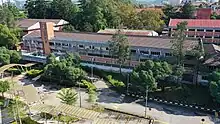Former names | Tunku Abdul Rahman College (1969–2013) Tunku Abdul Rahman University College (2013–2022) | ||||||
|---|---|---|---|---|---|---|---|
| Motto | Beyond Education | ||||||
| Type | Private | ||||||
| Established | 1969 | ||||||
| Chairman | Liow Tiong Lai | ||||||
| President | Lee Sze Wei | ||||||
| Students | About 28,500 | ||||||
| Location | 3°12′54″N 101°43′42″E / 3.215118°N 101.728345°E | ||||||
| Campus | Kuala Lumpur Campus Penang Branch Perak Branch Johor Branch Pahang Branch Sabah Branch | ||||||
| Website | www | ||||||
| Chinese name | |||||||
| Simplified Chinese | 拉曼管理与工艺大学 | ||||||
| Traditional Chinese | 拉曼管理與工藝大學 | ||||||
| |||||||
| Abbreviated name | |||||||
| Simplified Chinese | 拉曼理工大学 | ||||||
| Traditional Chinese | 拉曼理工大學 | ||||||
| |||||||
Tunku Abdul Rahman University of Management & Technology, abbreviated TAR UMT, is a non-profit, private university in Malaysia. Named after the country's first prime minister, Tunku Abdul Rahman, the school was founded in 1969 as Tunku Abdul Rahman College (or TAR College) by the Malaysian Chinese Association (MCA). On 2 May 2013, it officially became a university college under the name Tunku Abdul Rahman University College (TAR UC) and in 2022, the institution was upgraded to a University, changing its name to TAR UMT.
TAR UMT's main campus covers 171 acres (69 ha) at Jalan Genting Kelang in Malaysia's capital, Kuala Lumpur. The university also has five branches across Malaysia, in the states of Penang, Perak, Johor, Pahang and Sabah. The first branch campus, in Penang, began at a temporary location in 1994 before moving to Tanjung Bungah five years later. The second and third branch campuses were founded in Kampar, Perak and Johor in 1998, and the Pahang faculty branch was established in 1999. The Sabah faculty branch was founded in 2002 in Sabah, East Malaysia.
TAR UMT is the only institution in the world to conduct the Internally Assessed ACCA Fundamentals programme,[2] and the only institution in Malaysia to be granted the Graduate Gateway status by the Chartered Institute of Marketing.[3] TAR UMT obtained a SETARA 5-Star rating for the year 2018/2019 awarded by the Ministry of Higher Education, in its inaugural participation.
.jpg.webp)
History
In the early years of Malaysian independence, there was a lack of opportunity to pursue higher education. An institution of higher learning was suggested by Malaysian Chinese Association president Tan Siew Sin. Tan initially suggested the Chinese-language Merdeka University, which was rejected by the government. As a compromise, an English-medium college was proposed. In April 1968, Tan appointed a working team (chaired by Khaw Kai Boh) to make recommendations for an institution of higher learning.[4]
Its blueprint was submitted to the government, and received the support of Minister of Education Mohamed Khir Johari. The working team estimated that it would require RM 20 million to set up the college, and the government agreed to provide the financial assistance on a dollar-for-dollar basis. Prime Minister Tunku Abdul Rahman consented to the college being named for him.
TAR College began operations on 24 February 1969 with its School of Pre-University Studies and an initial enrollment of 764 students. A 15 September 1972 Instrument of Government provided the legal framework for the administration of the college. Minister of Education Hussein Onn presented the instrument to Tan Siew Sin, the first college president. To raise funds for a campus in Kuala Lumpur, the MCA launched a national fundraising campaign in 1972 led by MCA publicity director Lee San Choon.
In February 1973, the government approved the allocation of land for the main Kuala Lumpur campus in Setapak. The ground-breaking ceremony was officiated by Rahman in August 1973. Phase one, including an administrative building, a library, two laboratory blocks, one large and eight small lecture theatres and a canteen, was completed in 1976.
Fundraising activities in the 1990s, such as the nationwide TAR College Fund-Raising Campaign, Taxithon, Walkathon, TAR College Torch Run and Motorthon, were led by TAR College Council chairman Ling Liong Sik. Expansion continued under the leadership of TAR College Council chairmen Ong Ka Ting and Chua Soi Lek. Since its 2013 upgrade to a university college, TAR UC continued its steady development under the leadership of Liow Tiong Lai. The latest infrastructure development, a ground breaking ceremony for the construction of a Student Centre at the Kuala Lumpur Main Campus was held on 30 October 2021.
Targeted to be completed in 2024, this Student Centre is a dedicated hub for students’ activities which will be equipped with many modern facilities and amenities and it is aimed at enhancing the multi-dimensional learning for students. The Student Centre is a 7-storey building with total built-up area of 1,470,832 sqft comprising 1,408 car parking lots.
Institutional Awards
SETARA 5-Star Ranking
Obtained SETARA 5-Star rating for the year 2018/2019 under the University Colleges category by the Ministry of Higher Education, in its inaugural participation.

Notable alumni
- Chow Kon Yeow, Chief Minister of Penang (2018–Present)
- Chong Eng, Penang State Executive Councillor (2013–Present)
- Teresa Kok, Member of Parliament of Seputeh (1999–Present)
- Salahuddin Ayub, Minister of Domestic Trade and Living Costs (2022–2023)
- Teo Kok Seong, Negeri Sembilan State Executive Councillor (2018–Present)
- Liow Cai Tung, Johor State Executive Councillor (2018–2020)
- Gan Mei Yan, actress & host
- Karen Kong Cheng Tshe (龚柯允), singer
- Wayne Chua Poi Suan (蔡佩璇), actress
- Roger Tan Kor Mee, lawyer
References
- ↑ "TAR UC Celebrated University Status with Logo Design Competition". TARC. TARC. Retrieved 21 July 2022.
- ↑ "Kho Sok Kee, vice president of administration and facilities development, TARUMT | ACCA Global". www.accaglobal.com. Retrieved 2 July 2019.
- ↑ "Liow: TARUMT hopeful of gaining university status". thestar.com.my. Retrieved 23 February 2019.
- ↑ Leo Suryadinata, ed. (30 December 2012). Southeast Asian Personalities of Chinese Descent: A Biographical Dictionary. ISEAS Publishing. p. 403. ISBN 978-9814345217.